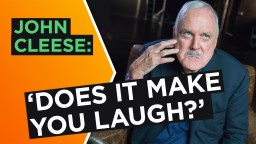PAUL F. TOMPKINS: One of the best lessons I ever learned was that someone who speaks up at a show is not necessarily a heckler. When I first started out, anyone that said anything, I was so rattled by it that I would attack that person and try to shut them down and assert my dominance, you know, over the room. Like I'm in charge, I'm the guy with the microphone. And it took me a while but then I realized oh sometimes people are just – they're forgetting themselves. They're agreeing with the thing that you said. They're trying to add on to an idea that you just put out there. And then I realized anytime anything like that happens this is an opportunity for more fun. So I would always start out – I learned to, when I was confronted with someone saying something to ask in a friendly tone, oh what did you say, you know. To let them know I'm not trying to attack this person because you have to let the audience know because it can turn a room very quickly if you're too aggressive with someone, if you're too upset by it people can sense this. And it's unpleasant and it's uncomfortable for people. And so what I always like to communicate to an audience if someone says something is everything's okay. I'm going to ask this person what they said and maybe we'll have a conversation. But it's all going to be fun the whole time.
It's also a covert defense mechanism because if I let this person talk and then they reveal themselves to be someone who does want to ruin the show, now everybody is on my side because I've been nice so far. So it's also – it's win-win because it's either we're going to have a fun conversation with this strange person who started talking or I will give this jerk enough rope to hang himself and then the audience will be on my side when I do have to shut him down. But more often than not, people are just kind of forgetting themselves or they get wrapped up in it and they want to talk to you because you're talking, you know. And I've had some great fun times talking to people from the audience who just accidentally spoke up.





